Have you ever wondered if cats can eat tofu? It’s a question many pet owners are asking. After all, tofu is rich in protein and vitamins, making it a healthy snack for humans – but does the same hold true for our feline friends?
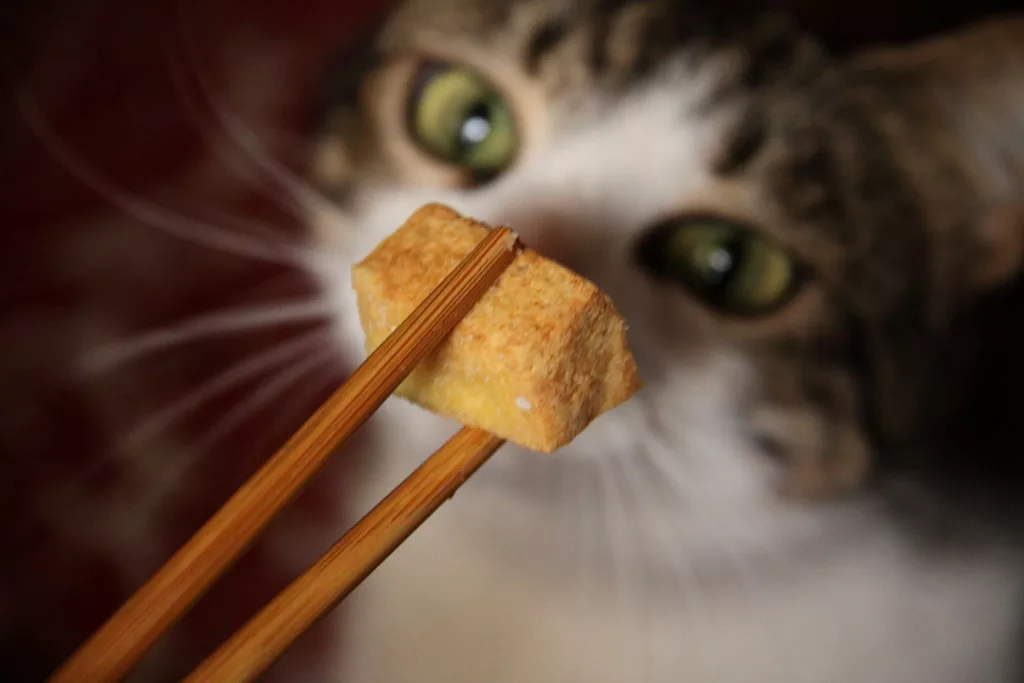
Tofu has been gaining popularity as an alternative food source, with some people even feeding their pets this soy-based product. But before you give your cat tofu to munch on, there are some key factors that need to be considered first.
In this article we’ll investigate whether or not cats can safely consume tofu and look at what benefits (if any) this unusual snack could provide them with. From assessing the nutritional value of tofu to discussing potential health risks associated with its consumption by cats, we’ll cover everything you need to know about serving up this vegan treat!
In order to answer that question, we need to look into what makes up tofu and if it presents any health risks for cats. Tofu contains not only soybeans but also water, salt, and other additives depending on its type. There are different kinds of tofu specifically formulated for animals like dogs or cats, so it isn’t completely unheard of for pets to have some form of tofu as part of their diet. However, many cat owners may be concerned about whether or not cats should eat tofu due to potential health concerns associated with too much soy consumption by felines. Therefore, understanding just how healthy (or unhealthy) tofu is for cats will help us determine whether or not it’s safe for them to consume.
Table of Contents
What Is Tofu?
Tofu is a popular food item made from soybeans. It’s high in protein and has become increasingly more commonplace on grocery store shelves all over the world. As cats eat tofu gains popularity, it begs the question – can cats safely consume this product?
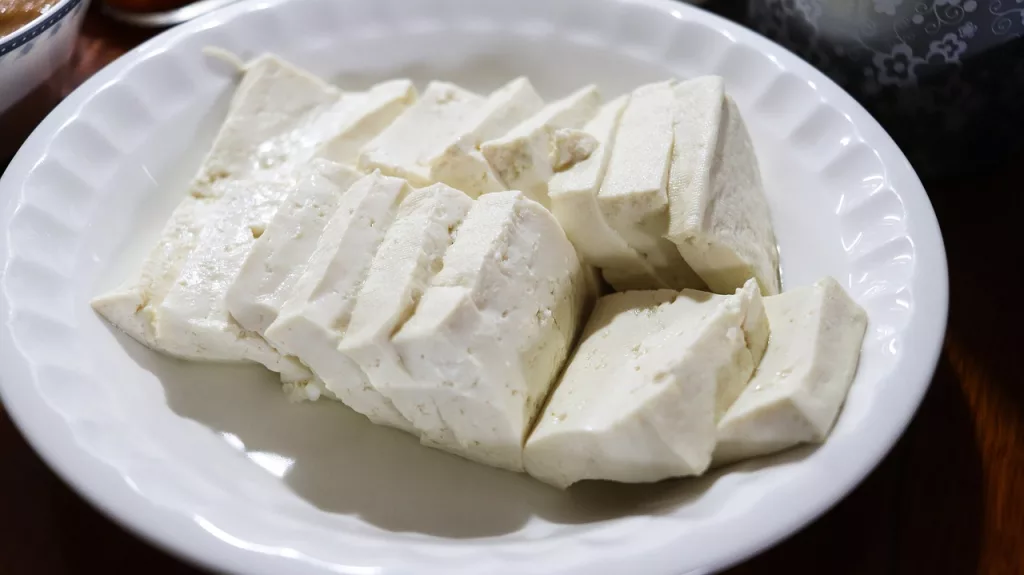
Is Tofu Healthy For Cats?
As the old adage goes, ‘curiosity killed the cat’. But in this case, is tofu healthy for cats? Tofu can be a tricky food when it comes to our feline friends. Here are 3 things to consider when deciding if cats eat tofu:
- Whether or not cats can digest it;
- If it contains any toxic ingredients that may harm them; and
- The nutritional benefits of eating tofu.
When it comes to digestion, cats have sensitive systems that don’t always handle new foods well. So while they may try out different flavors and textures from time-to-time, nutritionists recommend introducing novel items slowly and carefully so their stomachs can adjust accordingly. As far as potential toxicity concerns go, there are some components of tofu which could be potentially dangerous for cats – particularly with regards to excessive sodium intake. Therefore, experts suggest limiting their consumption of soy-based products like tofu as much as possible in order to avoid any adverse effects down the road. Finally, although some nutrients found in tofu such as calcium and iron may benefit your pet’s health, other trace elements like phosphorus might pose a risk depending on how much you’re serving up each day.
Given all these factors then, if you decide that yes cats do eat tofu occasionally – proceed with caution! Be mindful about portion sizes and keep an eye out for signs of distress after meals (such as vomiting or diarrhea). Ultimately though, understanding the nutritional benefits of tofu for cats will help ensure your pet enjoys its meal without having to worry about negative consequences later on.
Nutritional Benefits Of Tofu For Cats
We all know cats love their food, and it can often be hard to find something that is both healthy for them and tasty. Tofu is a great possible option – but how beneficial is it actually? Let’s explore the nutritional benefits of tofu for cats!
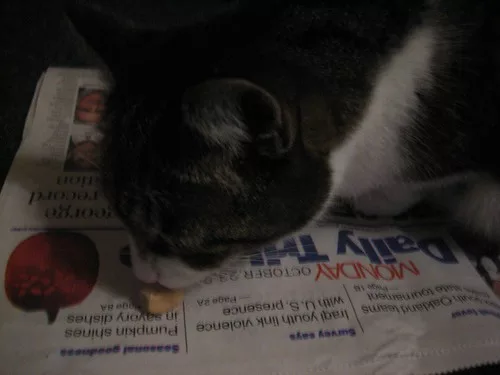
Tofu contains essential proteins which are vital for cats’ health and wellbeing, as well as other minerals such as iron and magnesium. Additionally, they also provide an excellent source of vitamins B1, B2, and K – all necessary components in helping maintain your cat’s diet. Plus, because tofu is low in fat, it’s ideal if you’re looking to help manage your pet’s weight effectively.
What’s more, there have been no reports of toxicity from cats eating tofu – so this could make it a safe choice for those times when you want to give your furry friend something different. So while we must still consider whether or not cats should eat tofu given their dietary needs…
Can Cats Eat Tofu?
Cats are obligate carnivores and their digestive systems are not adapted to digest plant-based proteins such as tofu. While tofu is not toxic to cats, it is not a good source of nutrients for them and feeding a lot of it can lead to malnutrition. It’s best to stick to a balanced and nutritionally complete diet for cats, consisting mainly of meat and animal-based protein.
Preparing Tofu For Cats
Prepping tofu for cats can be a perplexing process. Providing protein-packed plant-based food to felines requires careful consideration and conscientious preparation. Cooked correctly, cats eat tofu as an alternative to animal protein with promising potential.
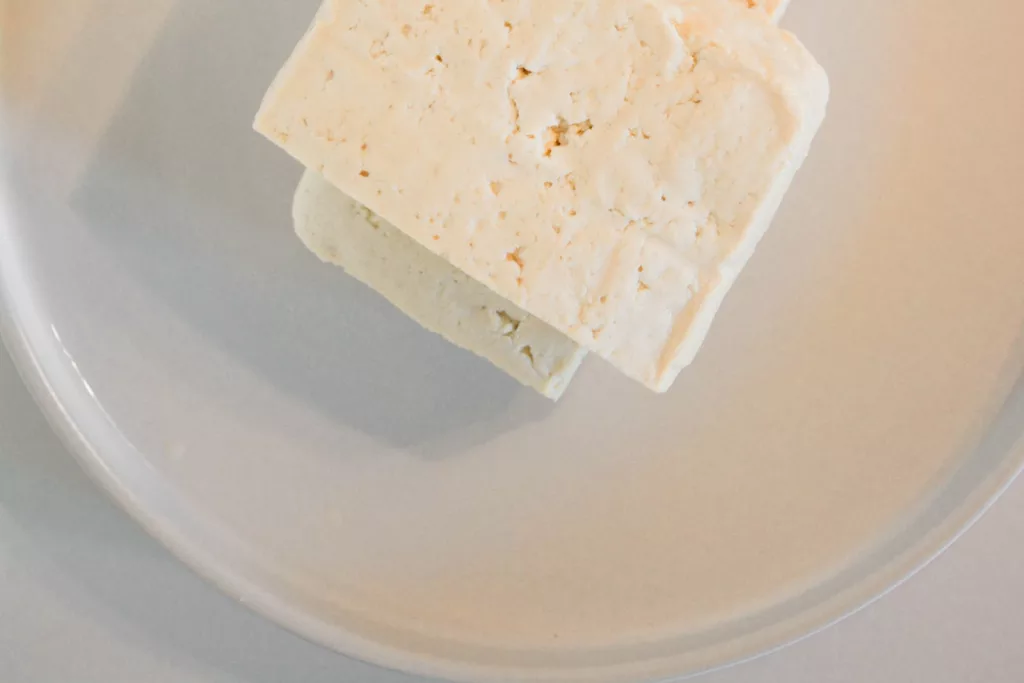
To get it right when feeding your furry friend the soybean treat: 1) Select organic tofu for maximum nutrition; 2) Cut into small cubes or strips to make easier for cat consumption; 3) Ensure all pieces are cooked thoroughly before serving. When preparing tofu for cats, remember that cats eat tofu in moderation as part of a balanced diet.
With precautions taken and instructions followed, tofu presents itself as a viable solution to supplement kitties’ diets with its nutrient content comparable to meat proteins. But even if not used exclusively, introducing the soy product makes for an excellent substitute for animal protein on occasion.
Tofu As A Substitute For Animal Protein
Imagine cats enjoying the softness and creamy texture of tofu, a vegetarian alternative to animal protein. Tofu has been recognised as an excellent source of nutrition for cats with its high levels of proteins, minerals and vitamins – all essential components that help keep cats healthy. But can cats eat tofu?
Tofu is a great substitute for animal proteins in cat diets, offering similar nutrients but without the saturated fats found in meat sources. It’s easy to digest, making it suitable even for kittens and senior felines who may have digestive issues. Plus, unlike some other plant-based products like legumes or peanuts, it doesn’t contain any anti-nutrients, which could potentially be toxic if ingested by cats. So when it comes to providing your beloved pet with a balanced diet while avoiding animal proteins, tofu can certainly do the job!
However, just because they can consume it doesn’t necessarily mean that they should; this leads us to our next question: Can cats digest tofu?
Can Cats Digest Tofu?
It is a popular theory that cats can digest tofu, as it is an alternative to animal protein. But do cats really have the ability to properly break down and absorb the nutrients from tofu? Let’s examine this further:
First of all, there are certain benefits associated with feeding your cat tofu; for instance, it has been found that some cats are less likely to experience allergic reactions due to its lack of dairy or egg proteins. Additionally, tofu provides essential amino acids which are beneficial for healthy tissue growth and repair in cats.
However, it is important to note that not every cat will be able to tolerate tofu well. It’s crucial to pay close attention when introducing new foods into your pet’s diet so you can identify any potential signs of adverse reaction such as vomiting or diarrhea. Furthermore, while cats may be able Digest tofu they may not benefit nutritionally from it because their bodies need more than just plant-based proteins.
In light of this information about optimal nutrition for felines, we should explore what risks might come along with feeding cats too much tofu – if any at all.
Risks Of Feeding Tofu To Cats
We’ve all heard stories about cats eating strange things, but can they really digest tofu? Is it safe for cats to consume this soy-based product? While the jury is still out on whether or not cats eat tofu – especially in large quantities – there are some risks associated with feeding your cat any type of non-cat food.
Here are a few potential risks when giving your cat Tofurky and other types of tofu:
• Lack of essential vitamins and minerals: Cats need specific nutrients in their diet that aren’t found in most plants.
• Possible allergic reactions: Some cats may be more sensitive than others and could develop an adverse reaction after consuming tofu.
• Upset stomachs: Too much tofu could lead to digestive issues such as vomiting or diarrhea.
• Nutritional imbalances: Eating too much plant-based foods could cause nutritional deficiencies in cats over time.
It’s hard to say if introducing small amounts of tofu into your cat’s diet will have any negative impact, so keep an eye out for signs of intolerance like decreased appetite, lethargy, and weight loss. If you notice these symptoms, it might be best to stop feeding your cat tofu altogether. Moving forward, we’ll discuss the various signs of tofu intolerance in cats that pet owners should look out for.
Signs Of Tofu Intolerance In Cats
It’s a sight that would make any cat owner cringe: the telltale signs of tofu intolerance in cats. From vomiting and bloating to diarrhea and other digestive issues, it can be heartbreaking to watch your beloved pet suffer – especially when food is the cause.
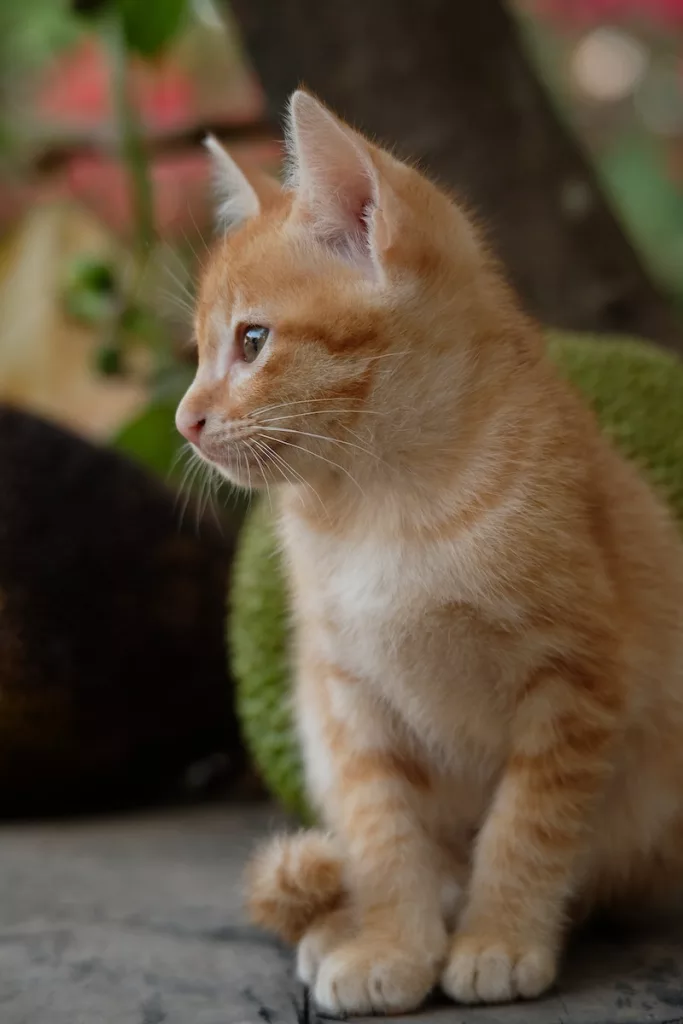
Fortunately, there are ways you can identify if their reaction to eating tofu is negative. Symptoms like excessive gas or stomach pain may indicate that they’re having difficulty digesting the food. Additionally, cats who eat tofu might experience constipation due to its high fiber content. In some cases, this could also lead to weight gain from overeating as well as lethargy caused by an inability to absorb nutrients properly.
If your cat shows any of these signs after consuming tofu, it’s important to take note and monitor their reaction carefully. Taking them for regular check-ups with your veterinarian will help determine whether or not soy products should be avoided in their diet entirely.
Monitoring Your Cat’s Reaction To Tofu
When cats eat tofu, it’s important to monitor their reaction. Tofu is a great source of protein for felines and can be found in many commercial pet foods as well as products like Tofurky. However, some cats are unable to tolerate this food item due to its high levels of phytoestrogens or other allergies.
To ensure your cat won’t suffer any adverse reactions after ingestion, you should slowly introduce small amounts into their diet and observe how they respond. If there are no signs of digestive distress such as vomiting, diarrhea or more serious health issues like kidney failure, then the cat may safely enjoy regular servings of tofu-based meals with little risk involved. But if symptoms do occur, discontinue feeding immediately and seek veterinary assistance while exploring alternative sources of nutrition for your beloved pet.
It’s best to err on the side of caution when introducing new items into a feline’s diet; monitoring closely allows you to make sure that your furry companion remains healthy. Moving forward, let’s take a look at alternatives to tofu for cats.
Alternatives To Tofu For Cats
If you are looking for an alternative to tofu for your cat, there are several options. Soy milk is one of them; it provides cats with protein and essential amino acids that can benefit their health. Cats can also eat other bean products such as edamame or tempeh in small amounts. Additionally, cooked plain chicken is another great source of protein that many cats enjoy.

However, the most important factor when considering any food item is how well your cat tolerates it. Cat tofu is a popular option because it’s low in fat and has plenty of nutrients, but some cats may have difficulty digesting it due to its texture. Therefore, if you choose to give your cat tofu as part of their diet, be sure to monitor their reaction closely. Taking these precautions ensures that your pet will get all the benefits with no adverse effects on their health. Transitioning into the next section, let’s take a look at tips for introducing tofu to your cat’s diet without causing any digestive issues.
Tips For Introducing Tofu To Your Cat’s Diet
Introducing a new food to your cat’s diet can feel like a daunting task. But with tofu, you can be sure that it will provide your furry friend with plenty of health benefits. From its high protein content to the variety of vitamins and minerals it contains, feeding cats tofu is an excellent way to improve their overall nutrition.
When introducing tofu into your cat’s diet, start by mixing small amounts of it in with their regular meals. Over time, increase the amount of tofu until they are eating only this soy-based product. It’s important to remember that cats do not naturally eat large amounts of plant-based proteins such as tofu, so monitor their intake carefully. You may need to add flavor enhancers or mix in other foods for them to get used to the idea of consuming more plant-based proteins. Additionally, make sure you’re using organic, non-GMO varieties for maximum nutritional benefit and safety for your pet.
In order to ensure that your cat enjoys all the amazing health benefits from eating tofu without experiencing any adverse effects, pay attention to how they react after each meal and adjust accordingly. With some patience and careful monitoring on your part, you can help give your cat a nutritious and delicious alternative to traditional meats – one that could potentially transform their life!
Conclusion
In conclusion, tofu can be a healthy addition to your cat’s diet in some cases. It provides protein and other essential nutrients for cats, but it should only be given as an occasional treat or supplement in small amounts. While there are nutritional benefits of feeding tofu to cats, you should monitor their reaction closely to ensure they do not have any signs of intolerance such as vomiting or diarrhea. If these occur, discontinue the use of tofu immediately and seek veterinary advice if necessary.
Keep in mind that even though tofu is packed with health benefits, it does not replace a balanced diet tailored to your cat’s individual needs. As always, moderation is key; too much of anything may lead to adverse effects on your pet’s health. So why not try offering your furry friend a little bit of tofu every now and then? Who knows – they might just love it!
My name is Ben and I am a cat lover. I’m not a professional writer or a doctor or an expert of any kind on anything. But I am a guy who likes to share what little knowledge and experience I have with others.
